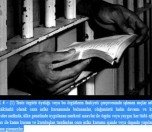Click to read the article in Turkish / Kurdish
Responding to Republican People's Party (CHP) İstanbul MP and member of Commission on Human Rights Watch Gamze Akkuş İlgezdi's parliamentary inquiry regarding "Student imprisoners in penal institutions, Minister of Justice stated that there were 69,301 students in prisons in total who were still exercising their right to education.
As of November 2016, there are 197,297 prisoners in penal institutions and the number of student prisoners constitute 35% of all the prisoners.
36,033 of these 69,301 students behind bars are registered to high schools and their equivalents or to an undergraduate programme. 33,268 others are registered to an open/distance education faculty.
According to the data of the Ministry of Justice, there were 2,776 students in prisons as of May 2013. This figure has increased by a factor of 25 in four years and reached 69,301 by the end of 2016.
Click - Prisoners' Right to Education Obstructed Through Statutory Decree
Barriers to right to education
Stating that the number of students in prison has hit the highest in the history of Turkey as the current Government was in power, İlgezdi said "the barriers to exercising the right to education should be removed for the students behind bars and they should be allowed to get unconditional education free of charge.
In her report on the students in prisons, İlgezdi listed the main problems the students are facing as:
They cannot afford the costs of education
* Difficulties in renewing the registration for the new school-year
* Difficulties to cover the cost of education due to lack of financial possibilities
They are being expelled due to absence
* Student in prison who miss on classes with compulsory attendance and are not considered 'excused' cannot pass the courses or are being expelled due to absence.
* Students whose legal process continues lose their rights to education due to absence, the inability to renew registration and enter exams.
Difficulties in taking exams
* Attending an exam turns into a great challenge/financial difficulty for most of the students.
* Problems are being experienced in providing necessary vehicles to take the students to their universities/schools and the students mostly have to pay a massive amount of money to cover the costs of these ring-shuttles.
Distance between school and prison
* Most of the student's university/school is far way from the prison they are in. The fact that they are being kept in prisons which are in a different province than their university/school and that their request of being transferred are being rejected, takes away their right to education.
Lack of study space
The fact that there are no rooms, libraries, computers, internet ... etc. is not in compliance with the principle of equality in the Constitution. (YY/DG)





